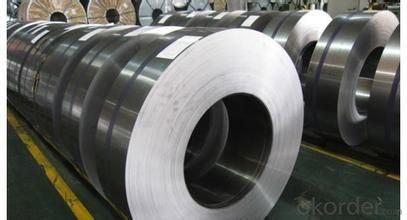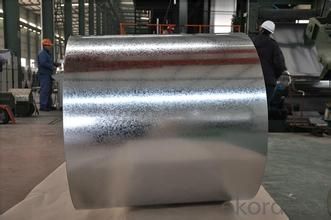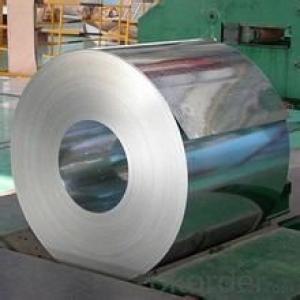hot-Dip Galvanized/ Aluzinc Steel in SGCC grade in China
- Loading Port:
- Tianjin
- Payment Terms:
- TT OR LC
- Min Order Qty:
- 100 m.t.
- Supply Capability:
- 5000000 m.t./month
OKorder Service Pledge
OKorder Financial Service
You Might Also Like
Description:
Hot-dip galvanized steel coils are available with a pure zinc coating through the hot-dip galvanizing process. It offers the economy, strength and formability of steel combined with the corrosion resistance of zinc. The hot-dip process is the process by which steel gets coated in layers of zinc to protect against rust. It is especially useful for countless outdoor and industrial applications.
Specifcation:
1.Mateials:SGCC,DX51D / DX52D /S250,280GD
2.Size:width:600-1250mm(900mm,1215mm,1250mm,1000mm the most common)
thickness:0.15-2.0mm
length:1000-6000mm,as your require
3.Zinc coating :60-180g( as required)
4.Coil id:508mm
5.Coil weight: 3-5MT(as required)
6. Surface:regular/mini/zero spangle, chromated, skin pass, dry etc.
Images:


We can ensure that stable quality standards are maintained, strictly meeting both market requirements and customers’ expectations. Our products enjoy an excellent reputation and have been exported to Europe, South-America, the Middle-East, Southeast-Asia, Africa and Russia etc.. We sincerely hope to establish good and long-term business relationship with your esteemed company.
- Q:How are steel coils annealed to improve their properties?
- Steel coils are annealed by heating them to a specific temperature and then slowly cooling them down. This process helps to relieve internal stresses, improve ductility, and refine the grain structure, resulting in enhanced mechanical properties.
- Q:What are the factors influencing the price of steel coils?
- The price of steel coils can be influenced by a variety of factors. These factors include: 1. Raw material costs: The cost of raw materials, such as iron ore and coal, directly affects the price of steel coils. Fluctuations in commodity prices can have a significant impact on the overall price. 2. Supply and demand: The balance between supply and demand in the steel industry plays a crucial role in determining the price of steel coils. If there is high demand, prices are likely to increase. Conversely, if there is an oversupply, prices may decrease. 3. Production and manufacturing costs: The cost of producing and manufacturing steel coils, including labor, energy, and transportation costs, can also impact the final price. Any changes in these costs can influence the overall price. 4. Currency exchange rates: The price of steel coils can be affected by fluctuations in currency exchange rates. If the currency in which steel is traded weakens against other currencies, it can result in higher prices. 5. Government regulations and policies: Government regulations, such as import tariffs, export restrictions, and environmental regulations, can impact the price of steel coils. These regulations can affect the cost of production and trade, ultimately influencing the price. 6. Market competition: The level of competition among steel manufacturers and suppliers can also impact the price of steel coils. If there are many suppliers and manufacturers, it can lead to competitive pricing and potentially lower prices. Conversely, if there are few suppliers dominating the market, prices may be higher. It is important to consider that these factors can vary over time and in different regions, which ultimately affects the pricing of steel coils in the market.
- Q:I need to know a name of any site which provides information on Steel structures??
- steel structure- TC bolt to connect,SG shear wrench
- Q:Does aluminum or steel hold up better? We found a steel for 1/2 the price of aluminum, obviously its heavier but any other downsides? rust faster ect? also, does anybody know, in PA do you pay sales tax on trailers? and do dealers normally give you license plates to get the trailer home with? we live 3 hours away from the dealer so thats why i want all details :) would stink if i messed up!!
- We have an aluminum trailer over a steel frame. We used to have a steel trailer. There are two differences I see are the weight and how quickly they deteriorate. I personally prefer the aluminum over the steel, the upkeep is easier and they don't weigh as much which equates to fuel savings. Also if you have a lighter truck an aluminum trailer makes the wear and tear a little easier. You can also look at the size of the truck you are going to tow the trailer with, and the size of the horses inside. All together you definately don't want to exceed the weight limits of the truck. Hope this helps...
- Q:What are the different types of steel coil packaging materials used during processing?
- There are several different types of steel coil packaging materials used during processing, including steel strapping, plastic strapping, stretch film, corner protectors, edge protectors, and wooden crates.
- Q:What are the different types of steel coil storage containers?
- There are several types of steel coil storage containers, including coil racks, coil cradles, coil saddles, and coil cars.
- Q:How are steel coils inspected for bendability?
- Steel coils are inspected for bendability using a variety of methods to ensure their suitability for various applications. One common inspection method is the 3-point bend test, where the coil is subjected to a bending force at three specific points along its length. This test helps determine the coil's resistance to bending without fracturing or breaking. During the 3-point bend test, the coil is placed on a support system with two fixed points and one movable point. A force is then applied to the movable point, causing the coil to bend. The amount of force required to achieve a specific level of bending is measured and compared against acceptable standards. Another method used for inspecting steel coils is the mandrel bend test. In this test, a mandrel of a specific diameter is inserted into the coil and bent to a specified angle. The coil is then examined for any signs of cracking or deformation. This test helps determine the coil's flexibility and ability to withstand bending without damage. Visual inspection is also an important part of the inspection process. Trained inspectors visually examine the coil for any visible defects such as cracks, deformations, or irregularities. They also check for proper coil dimensions and uniformity throughout. In addition to these methods, non-destructive testing techniques like ultrasonic testing or magnetic particle inspection may be used to detect any internal defects or flaws that may affect the bendability of the coil. Overall, a combination of mechanical testing, visual inspection, and non-destructive testing methods are employed to ensure that steel coils meet the required bendability standards. These inspections help ensure the quality and reliability of the steel coils for various industries where bendability is a critical factor.
- Q:How are steel coils used in the production of infrastructure materials?
- The durability, versatility, and strength of steel coils make them widely used in the production of infrastructure materials. Typically, these coils are made from hot-rolled steel, forming large rolls or coils that are easily transported and handled. One common application of steel coils in infrastructure materials involves producing steel sheets and plates. These coils can be further processed to create flat sheets of steel, which are then utilized in various construction purposes. For instance, steel sheets are frequently employed in manufacturing bridges, highways, and buildings due to their ability to withstand heavy loads and adverse weather conditions. Another important use of steel coils in infrastructure materials is manufacturing pipes and tubes. Steel coils are often processed into seamless or welded pipes that find usage in water and gas pipelines, as well as the transportation of liquids and gases. Infrastructure projects prefer steel pipes and tubes due to their high strength, corrosion resistance, and ability to endure high-pressure environments. Moreover, steel coils are also employed in the production of reinforcing bars or rebars, crucial components in the construction of reinforced concrete structures. These rebars, made from coiled steel, are embedded within concrete to provide tensile strength and enhance the structural integrity of buildings, bridges, and other infrastructure projects. Steel coils enable efficient production of rebars, ensuring consistent quality and size for reinforced concrete constructions. In conclusion, the use of steel coils is essential in the production of infrastructure materials. Their contribution to manufacturing steel sheets, pipes, and rebars ensures the durability, strength, and reliability of infrastructure projects. By providing a versatile and robust material, steel coils contribute to the development of safe and long-lasting structures in our built environment.
- Q:What are the dimensions of steel coils used in the structural component industry?
- The dimensions of steel coils used in the structural component industry can vary depending on the specific application and requirements. However, some common dimensions for steel coils used in this industry include a width ranging from 600mm to 2000mm and a thickness ranging from 0.25mm to 10mm. The weight of these coils can also vary, typically ranging from a few kilograms to several tonnes. Additionally, the length of the steel coils can be customized to meet the specific needs of the structural component industry, with common lengths being 2000mm, 2500mm, and 3000mm. It is important to note that these dimensions are not exhaustive and can vary based on the specific product and manufacturer.
- Q:Any details about JinSong Ferritic Stainless Steel?
- The steel is added with Mo on the basis of 10Cr17 steel to improve its corrosive pitting resistance and crevice corrosion resistance; it has higher intensity and better salt solution corrosion resistance than 10Cr17 steel. The steel is mainly used in making automobile hub bearing, fastener and external decoration of automobile.
1. Manufacturer Overview |
|
|---|---|
| Location | |
| Year Established | |
| Annual Output Value | |
| Main Markets | |
| Company Certifications | |
2. Manufacturer Certificates |
|
|---|---|
| a) Certification Name | |
| Range | |
| Reference | |
| Validity Period | |
3. Manufacturer Capability |
|
|---|---|
| a)Trade Capacity | |
| Nearest Port | |
| Export Percentage | |
| No.of Employees in Trade Department | |
| Language Spoken: | |
| b)Factory Information | |
| Factory Size: | |
| No. of Production Lines | |
| Contract Manufacturing | |
| Product Price Range | |
Send your message to us
hot-Dip Galvanized/ Aluzinc Steel in SGCC grade in China
- Loading Port:
- Tianjin
- Payment Terms:
- TT OR LC
- Min Order Qty:
- 100 m.t.
- Supply Capability:
- 5000000 m.t./month
OKorder Service Pledge
OKorder Financial Service
Similar products
New products
Hot products
Related keywords






























